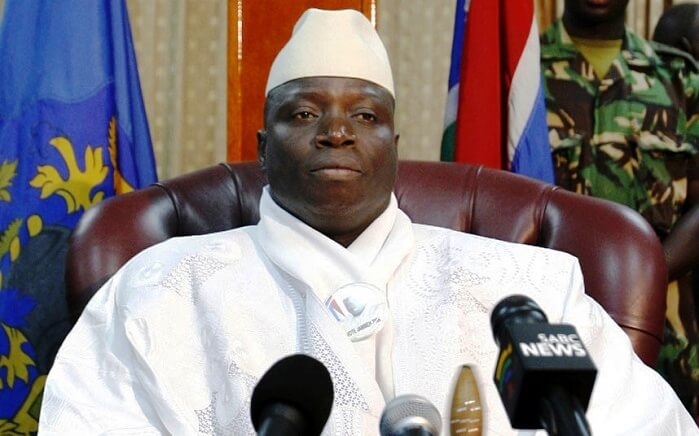 Yahya Jammeh, Gambian President[/caption]
Yahya Jammeh, Gambian President[/caption]
The outlook for Gambia seemed so bright just a few weeks ago. It is the smallest country in West Africa, and in recent years has perhaps been best known for the whims and abuses of its long-ruling dictator, Yahya Jammeh. Since taking power in a military coup, in 1994, Jammeh has been accused of targeting Gambian journalists critical of his government, some of whom have been arrested and killed, and of engineering the disappearance of other critics and activists. He has lashed out against homosexuality, promising to execute gays and lesbians; critics charge him with using the death penalty as a culling tool for political opponents, as well as executing people found guilty of crimes like drug possession. Usually dressed in a flowing white robe and matching stiff cap, carrying a walking stick, Jammeh has overseen Gambia as though he were the chief of a kingdom meant to cater to his needs and desires. Past Presidential elections have been marred by fraud. So when the election came around on December 1st, observers expected more of the same: Jammeh winning by a landslide through a dubious count. But he lost. And, even more stunningly, he conceded.
Then the troubles began. Jammeh’s opponent, President-elect Adama Barrow, is a property developer in his early fifties who was chosen to represent a coalition of opposition parties. In his campaign, he criticized the advances Jammeh boasted of in health and education as empty measures, and vowed to reform the judiciary and give more freedom to the press and civil-society groups. Other than that, not much was known about Barrow. There was no public trail of scandal and corruption allegations in his wake, and he wasn’t Jammeh, and, for many Gambians, that was enough. The country’s security forces shifted their support to Barrow, as well. After the electoral commission announced Barrow’s win—by a margin of twenty thousand votes, out of about half a million cast—the heads of the Army, police, and intelligence told Jammeh to accept defeat. Jammeh then went on television, so that all the country could see, and called Barrow to tell him that “the Gambian people had spoken” and that he wished him “all the best.” The call was even charming at some points: “Are you hearing me?!” he said, pulling the phone away from his ear to make sure that he and Barrow were still connected, a common practice on West African phone lines. But just a week later Jammeh announced that the election was fraudulent and that he would not be stepping down, after all; he wanted a new election. Gambia’s electoral commissioner has now fled the country, apparently fearing for his life.
In the first days after the election, the mood in Gambia had been ecstatic: people danced, played music, cheered in the streets, and posted emotional messages on social media. After Jammeh reneged on his concession, he reportedly ordered the roundup of protesters and people wearing #Gambiahasdecided T-shirts, had security forces close down three independent radio stations, and rebuffed international attempts to mediate the dispute. Omar Faye, Gambia’s Ambassador to the United States, recently called for Jammeh to step down, and is now being recalled to his country; he has told NPR that he fears for his safety if he returns.
Advertisement
In this kind of crisis, the African Union has not usually been of much help (its motto often seems to be “misrule and let misrule”), but the Economic Community of West African States, known as ecowas, says that it is ready to intervene if Jammeh does not step down, and that Senegalese troops are “on alert.” The hope, though, is for a negotiated settlement. Barrow is supposed to be inaugurated on January 19th, which is also the deadline ecowas has given Jammeh. After two successive elections in as many years in the region in which the incumbent has unexpectedly conceded—in Nigeria and Ghana—Jammeh’s behavior is actually becoming increasingly out of style. He is too flagrantly conflating his and the country’s interests, tying the integrity of Gambia to whether he can keep his post until a new election. The distastefulness of his greed for power, after a twenty-two-year-long stay in office, in which he reportedly amassed a personal fortune, may be what has pushed other West African nations to propose as a mediator a politician who forced out an incumbent himself, Nigerian President Muhammadu Buhari. It is too soon to say that there is a tide of electoral reform, but at least some of the continent’s leaders appear unwilling to let recent advances go to waste.
Jammeh has faced serious threats to his Presidency before, the last of which was a coup attempt in December, 2014, led by two Gambian-Americans, which was quickly subdued. Gambians haven’t been happy with their President for a long time, and Barrow, though an unknown, has come to embody the brazen injustices of the past years. He’s a symbol around which their hopes for the future of their country have coalesced, and one for which some may be ready to fight. It is a risky and potentially tragic moment. Jammeh has pronounced ecowas’s statement on its standby troops a “declaration of war,” and has said that he would defend the country against “any aggression.” The country’s Army chief has now said that he stands by the President. But Jammeh could be surprised, too. This time, he may be facing a battle he cannot win.
Alexis Okeowo is a staff writer with The New Yorker


